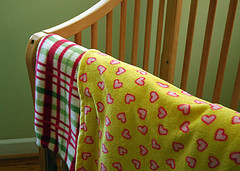 It’s 5:20 on a Saturday morning. K wakes me up: “Can you go get some milk for L and make sure she’s covered up?” If K goes, L starts fussing and crying when she leaves the room; it works out better for everyone if I go.
It’s 5:20 on a Saturday morning. K wakes me up: “Can you go get some milk for L and make sure she’s covered up?” If K goes, L starts fussing and crying when she leaves the room; it works out better for everyone if I go.
I stumble downstairs, warm some milk, and head to the Girl’s room. She’s asleep in the corner of the crib, blankets strewn about her but not a single one on her. I pry her sippy cup from her hand, causing her to wake up. With the refilled cup in her hand, L is about ready to go back to sleep, but she has one more request. She raises her head and says sleepily, “Banket.”
As I start to spread a blanket over her, she begins fussing. “Tata, no! Banket! Banket.” “Banket,” you see, is not just any blanket, but her favorite blanket, a soft yellow blanket she’s had since birth. It’s a bit too think for a chilly evening like this, so I spread the blanket over her, wait for her to drift to sleep, then cover her with a second blanket.
L’s vocabulary increases daily, and she’s begun making sentences and even her own shortened versions of words. Often, I’m not “tata” but “tat.”
“Chodz, tat!” she’ll say to me when dinner’s on the table and K’s sent her up looking for me.
Our cat, Bida, is sometimes “Bid.” “Trzymac” (“hold”) is “trzym,” pronounced “cim” (“chym” in English transliteration). “Jacket” is simply “Jack.”
And yet she’ll also unnecessarily extend some things. “Bida” can also be — indeed, usually is — “Bida kicia,” which would roughly be translated “Bida kitty.” And all cats, in books and in real life, become “Bida kicia.” We recently met a new cat named Kissy and tried to explain to L that this was “Kissy kicia,” but to no avail: “Bida kicia!”
“Kupa” and “siusiu” (“poo-poo” and “pee-pee”) are always said together. In fact, L likes to call Bida to the door, open it, and encourage her to go relieve herself in the yard. It sounds like this: “Bida kicia, chodz! Idz! Kupa siusiu!”
When Bida is outside and we ask L, “Where is Bida?”, the reply is always the same: “Kupa siusiu!”